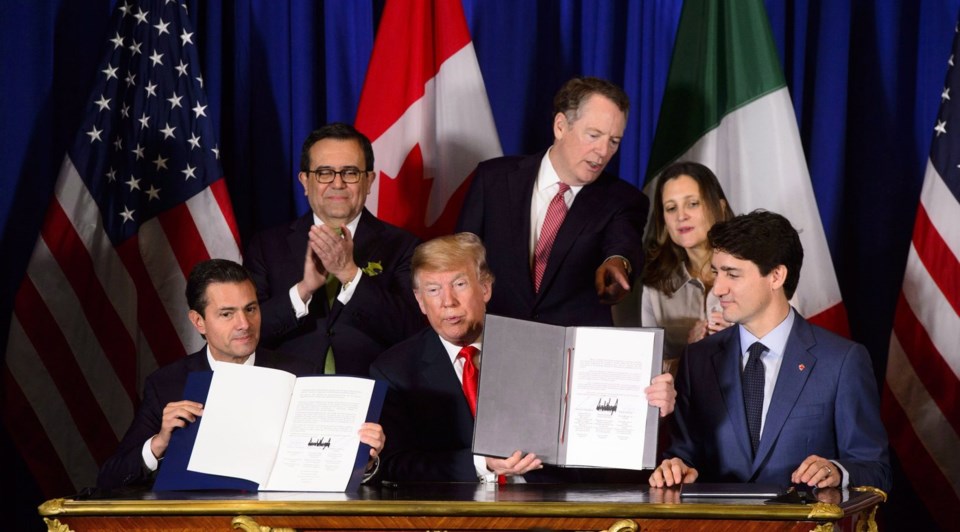OTTAWA — Donald Trump's mandate to get tough on trade is expected to be stronger in his second term as U.S. president, posing different challenges for Canada than his first four years in the White House.
Finance Minister Chrystia Freeland projected calm on Wednesday after the election, reassuring Canadians that the government is well-equipped to work with a Trump administration again.
But Goldy Hyder, president of the Business Council of Canada, is warning the past might not offer a good road map for dealing with a second Trump presidency.
He said the president-elect has a strong endorsement from the American public for his tough-on-trade platform that includes a promise to impose 10-to-20-per-cent tariffs on all goods flowing into the United States.
If Canada wants to convince the U.S. it's a reliable economic partner worthy of carve-outs, Hyder said things like the summer rail stoppage and recently announced emissions cap on the oil and gas sector won't help.
"America is interested in its own economic security and its own national security, and it is making a list of friends and foes, and everything in between. And we need to make sure that we are on the top, not near on the top, of the friends list," Hyder said.
Freeland highlighted on Wednesday that Canada reached a renegotiated free-trade agreement with the U.S. while Trump was president. She added that the federal government also shares Trump's concerns about Chinese overproduction.
Hyder said emphasizing shared priorities is important, but that it won't be enough for a Trump administration to overlook points of contention, including the digital services tax imposed by the Liberals on tech giants earning revenue in Canada.
"These other irritants that I've mentioned, will also be drawing their attention, and I think in a much more serious way, particularly defence," he said, noting that increasing defence spending will be a "must-do" to avoid stoking America's ire.
Last February, Trump said he would not defend a NATO member that is failing to spend the agreed-upon amount on defence, suggesting he would encourage Russia to do "whatever the hell they want" to those countries.
The Canada-United States-Mexico Agreement, which was negotiated during Trump's first term to replace NAFTA, is also up for review in 2026. Trump has vowed to renegotiate it.
Stephen Tapp, the chief economist at the Canadian Chamber of Commerce, said Trump will likely take a more combative stance on trade negotiations this time.
"The tariff man is back," Tapp said. "This is going to be terrifying for Canadian exporters and probably for Canadian policymakers to wrap their heads around how to deal with Trump in a second term."
Tapp says businesses are planning for various scenarios and that it's "incumbent" on the government to do the same.
A report authored by University of Calgary economics professor Trevor Tombe for the Chamber of Commerce estimates that a U.S. tariff of 10 per cent — in addition to retaliatory tariffs from other countries — would cost Canadians on average $1,100 in foregone income every year.
Just a little more than 24 hours after Trump's victory was declared, Trudeau revived a key cabinet committee on Canada-U.S. relations and tapped Freeland to chair it.
Freeland led negotiations for the new North American free trade agreement that was signed during Trump's first term in office.
Trade Minister Mary Ng said on Thursday the Canadian government has heard from U.S. businesses that they're concerned tariffs would hurt them as well.
"I trust that those American businesses will share their views with their new administration," Ng said.
"What our commitment here is to Canadian businesses, is you've seen us always stand up for Canadian interests, always stand up for Canadian workers. That won't change."
This report by The Canadian Press was first published Nov. 7, 2024.
Nojoud Al Mallees, The Canadian Press



